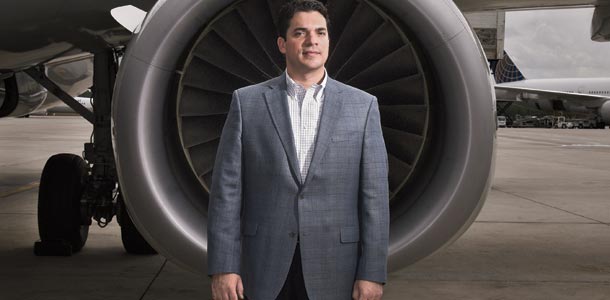In this extended version of the talk from our latest issue, we speak with Jimmy Samartzis, managing director of environmental affairs and sustainability at United Continental about testing biofuels and partnering with biofuel producers.
 Photo by Jay B. Sauceda
Photo by Jay B. Sauceda
"Fuel is our largest expense. That drives our interest in alternative fuels. So does sustainability. We're talking to some potential partners about availability beginning as early as 2012. What's key for us is agreeing on a price we can afford. And, frankly, we can't afford much more than what we pay for conventional jet fuel. We have partnerships with Rentech, Gevo, Solena, and Altair. Rentech made the synthetic fuel for a 2010 United test flight. For a 2009 Continental test flight, Sapphire Energy provided algae oil, and Terasol Energy provided jatropha oil. A lot of our work happens with the Commercial Aviation Alternative Fuels Initiative, an FAA-sponsored group of U.S. commercial aviation companies. We've also worked with the Defense Logistics Agency within the Department of Defense. It's responsible for procuring the fuel the military uses."
Fast Company: Besides your work with the Commercial Aviation Alternative Fuels Initiative and the Department of Defense, do you have any other government partnerships that will help advance biofuels?
Jimmy Samartzis: We've worked with the U.S. Department of Agriculture, which has a program called Farm to Fly. It's aimed at helping the farming community invest in the feedstocks required for commercial aviation biofuels.
What role does the farming community play in getting biofuels to take off?
A lot depends on the fuel producers, frankly. We've been signaling to the market that we're very interested in alternative fuels. We've been signaling that primarily through letters of intent. We sign an agreement saying we'll negotiate a definitive fuel supply agreement with a producer, and it gives them what they need to go after funding to develop their commercial plant that will produce that fuel. Still, the production quantity that any of these companies is talking about is relatively small.
Is the federal government encouraging biofuel use in any ways?
Yes, there are federal incentives to using biofuels that are helping bring the cost down. Renewable Energy Credits, for instance, are given to biofuel producers, who can then sell the credits on the open market. They then use revenue from that to, if you will, offset the cost to us. There are other tax credits too. If it weren't for these incentives, U.S. airlines, which are already having trouble being profitable every year and creating value consistently, can't really justify paying two or three times as much as they are paying for jet fuel today.
Overall, how does United Continental frame its environmental goals?
There are four pillars that make up our commitment to the environment: Reducing fuel consumption and improving fuel efficiency, advancing and using alternative fuels in our aircrafts, enhancing the sustainability of our products and services and reducing waste, and working together with our stakeholders. We've seen a lot of volatility in oil pricing, so that drives our interest in alternative fuels, but so does sustainability of course.
How do those principles apply to biofuels?
One of the requirements we set is that the biofuels we use have to deliver a reduction in lifecycle greenhouse gas emissions. We want to decrease our reliance on foreign oil and have alternatives to commercial jet fuel.